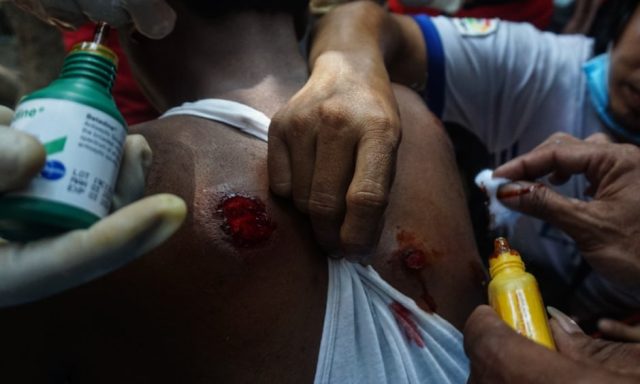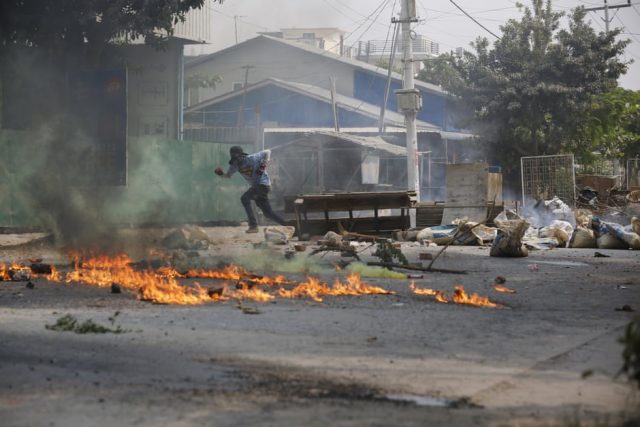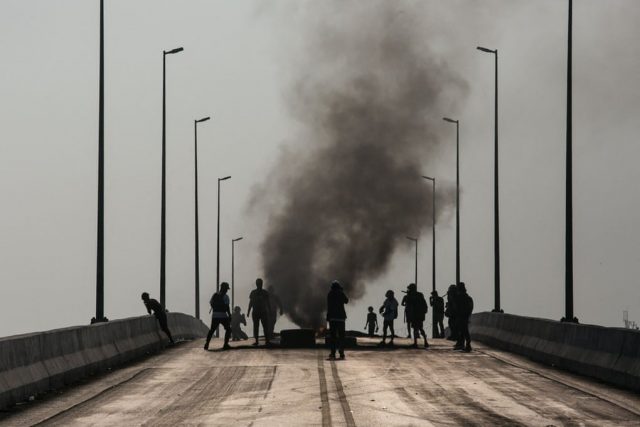A doctor who provides treatment to protesters injured by the military describes the daily violence and trauma of post-coup Myanmar
A doctor who provides treatment to protesters wounded by the army and police has described a week in the turmoil of the post-coup Myanmar.
When the military coup happened, I joined a group of medics providing treatment to protesters. Every day is a risky day for us. I may be captured, I may be shot dead. We don’t have bullet-proof vests. We have only a waistcoat and a stethoscope. Our ambulance has been shot at twice before; we just had to get out and run.
If we weren’t providing medical cover, there would be nowhere for people to get proper care. Many doctors and nurses are refusing to work in the government hospitals, because they are protesting against the junta. The only other place for the wounded is the military hospital.
I am doing this for my country’s people, and because I want my children to have a bright future.
Saturday
Every morning I say a prayer. I write my blood group, my emergency contact number, my weight and other credentials on my forearm. I tell my wife: if I don’t come back, you must live yourself and take care of the children. My wife is also very active in resisting the military coup. She tells me: do what you have to do, and if you die, I will be proud of you.
Today there was a protest by students. The military tried to capture them, but they ran away and hid in the local people’s houses. Residents refused to hand them over, so the military started shooting at them.

Protesters walk amid smoke near a makeshift barricade during a crackdown by security forces on demonstrations against the military coup in Yangon. Photograph: AFP/Getty Images
We waited in hiding around the local houses, trying to get the students home safely. We managed to get about 50 students out. It took half a day. Some of them were very afraid to move. They were so young, only 17 or 18.
The students had just bruises, but residents were shot for protecting them. One of the victims, who I cared for, had been shot in the back, near the kidney area. We couldn’t go into his house because all the lanes were blocked off by the military. The other residents managed to carry him to us. They moved him slowly from one house to another house. Eventually he reached our ambulance. At this point, he was barely breathing. There was a lot of blood. We tried to resuscitate but we were not successful. Four people were killed in the area.
Sunday
My team heard from our network that there had been another shooting in a nearby downtown area. There was no protest at the time, but the military was shooting while patrolling the streets. Four people were injured, including a 13-year-old boy. A woman was shot dead. Her body was lying on the road, but we had to wait nearly two hours to treat her because the military was spraying bullets nearby. The fatal wound was on the back of her head.
There are some patients we see, lying down on the street, who we cannot reach. The military takes them. They may die, they may not be treated. I think the official death toll is an underestimate. I think I have almost got PTSD. I laugh sometimes, I cry sometimes, I feel depressed sometimes. Sometimes I cannot sleep well.
I had not treated gunshot wounds before the coup. I learned from watching YouTube and from reading my medical and surgical books.
Monday
Usually, we connect with our peer-to-peer network on apps, but now the junta has cut everyone’s mobile data. Three people were killed locally today. One of the victims, whose death I certified, was just 20. The military was taking down barricades that residents had put up to protect their neighbourhoods, and the people, who were afraid, were making new barricades further down the road. The military started shooting at them.
We treated the patients in nearby homes. There was a gunshot wound to the shoulder, buttocks, as well as rubber bullet wounds, and one patient had cuts to the thigh.

Medics give first aid to a demonstrator who injured by a rubber bullet shot by riot police in Yangon. Photograph: Anadolu Agency/Getty Images
We stitched them up to control the bleeding, but without local anaesthesia. We don’t have lots of equipment with us, only our backpacks. We made an IV drip for them, and for the pain relief we gave only diclofenac (Voltaren). We need morphine sometimes but it is a controlled drug so we cannot get it easily.
We had to move locations three times as we treated the patients, because the military was coming. It’s like a war. The people living in the houses are very passionate towards us. As medical cover, we are the only help they can find.
If the patient’s condition is bad and there’s not much we can do, then they have to be moved to the surgeon, who performs operations in a safe place.
Tuesday
Today was quiet. Patients who were stitched yesterday were given wound dressings. We also went and gave money to the victims’ families. We give to wounded patients who have had to have limbs amputated as well. They are just poor people. Sometimes they have a wife and kids. In one case, a man who was killed had a wife who was three months pregnant.
At night time we could not sleep very well because the military was going around patrolling, shooting, and setting off stun grenades.
I no longer sleep at my home. I stay in a different place every night. I’ve done this for a month. I am afraid of being arrested in night raids. When the military comes, we turn the lights off in the house, and turn on the street lights, so that we can see what they are doing outside.

A man runs past a road barricade and burning debris in Mandalay, Myanmar. Photograph: STL/AP
Wednesday
Mobile data is still down. We trained other volunteers who are not medics, teaching them how to check patients, how to do the tourniquet, how to stop the bleeding. I am afraid for tomorrow; often one or two days of quiet are followed by violence.
Thursday
The military came again tonight, patrolling the area where I am staying and yelling at us not to go outside. The people on my street were OK, but in another nearby area one man was shot dead. He was a resident who had volunteered to stay out on night patrol, to alert others in case the military approached.
My daughter is afraid of the loud bangs and cursing. She asks me: why don’t the police come [to stop the shootings]? She has seen, in the movies, how the police are the good guys who take the bad guys out. It is a very hard question for me to answer. How can I tell her that those who are shooting the people are police and soldiers?
Whenever I go outside, she asks me when I will come back. She tells me: daddy, don’t go out they will shoot you. It is traumatic for children. Due to Covid, the schools have already been closed for around one and a half years. My daughter asks me when she can go out on a trip, but it is too dangerous for children to go outside. Luckily we have wifi and so she can watch YouTube.
I logged out of my Facebook a few days ago, so that I can concentrate on my work. There is too much rumour, fake news, psychological warfare by the junta, and graphic imagery on social media. There are live videos of people being slaughtered or captured and beaten. It’s hard to cope with that stimulus all the time. Sometimes, if I can’t sleep at night, I take antidepressants.
After the revolution is successful, I want to apply to open a clinic specialising in trauma and stress. We need it a lot. We feel insecure all the time. We feel the danger and violence. We are fearful all the time.
Interview edited for brevity and clarity
Original Post: The Guardian


